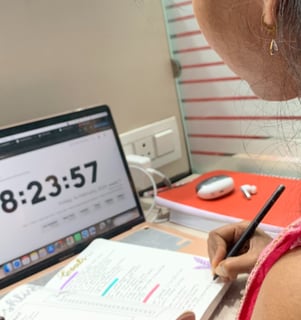Emotional Release Through Writing: Using Journaling as a Healing Tool
2/14/20254 min read
It was a regular weekday afternoon when I broke down in my room. I have kept it together all day—smiling, nodding, pretending everything was fine. But inside, I felt like I was drowning. The weight of stress, unspoken frustrations, and bottled-up emotions finally spilled over. I pulled an old notepad from my bag with shaking hands and started writing. What I started as a messy blur of words soon became a release—an outpouring of everything I had been holding in. And in that moment, as I let my emotions flow onto the pages, I felt lighter, as if I have finally given myself permission to feel, to heal. Journaling entered my life then.
By acknowledging and expressing our emotions through writing, we allow ourselves to process them in a healthy, constructive way. Journaling creates a space where emotions can be fully felt, understood, and released, preventing them from becoming overwhelming burdens.
Writing can help us:
Reduce stress and anxiety by externalizing worries and fears.
Gain clarity on difficult emotions and their root causes.
Let go of past pain by putting thoughts into words and releasing them.
Create emotional balance by reflecting on what we feel and why.
Why Journaling
Journaling is a deeply personal experience, and its power lies in its simplicity. It doesn’t require perfect grammar, structure, or a clear purpose—just an open heart and a willingness to express. Here’s how writing can help with emotional healing:
A Safe Space for Expression – Unlike conversations with others, journaling allows you to express yourself freely, without fear of judgment or misunderstanding.
Processing and Understanding – Writing forces you to slow down and articulate your thoughts, making it easier to untangle complex emotions.
Transforming Pain into Insight – Journaling helps turn difficult emotions into lessons, making it a powerful tool for self-growth.
Emotional Catharsis – Sometimes, simply writing about an experience can bring relief, as if you’re releasing the emotion onto the page.
Journaling Techniques to Try
There is no right or wrong way to journal, but if you’re unsure where to start, these techniques can help guide you toward emotional healing:
1. Stream of Consciousness Writing
Write freely without worrying about grammar, punctuation, or making sense. Let your thoughts flow onto the page without editing or censoring. This helps to clear mental clutter and release suppressed emotions.
Try this: Set a timer for 5-10 minutes and write whatever comes to mind. Don’t stop, don’t overthink—just let your thoughts pour out.
2. Letter Writing
Write a letter to someone (or even to yourself) that you’ll never send. This is especially powerful for unresolved emotions, grief, or unspoken words.
3. Emotional Check-Ins
Take a moment each day to check in with your emotions. Write about how you’re feeling and explore why those emotions are present.
Try this: Use prompts like:
“Right now, I feel… because…”
“Today, I noticed that…”
“Something I need to let go of is…”
4. Gratitude Journaling
Focusing on gratitude can shift our perspective and bring emotional relief. Even in difficult times, finding small things to appreciate can be healing.
Try this: Write down three things you’re grateful for each day, no matter how small.
Creating a Journaling Practice
To make journaling a sustainable habit, create a supportive environment that nurtures your emotional well-being:
Find a Quiet Space – Choose a peaceful spot where you can write without distractions.
Use a Special Journal – Having a dedicated notebook can make the practice feel more intentional.
Let Go of Perfection – Your journal is for you. Don’t worry about grammar or structure—just write.
Make it a Ritual – Set aside time each day or week to reflect and release through writing.
Be Gentle with Yourself – Some emotions take time to process. Allow yourself to write without pressure or expectations.
There’s no set rule for when to journal, but here are a few moments when writing can be especially beneficial:
When emotions feel overwhelming and you need a safe outlet.
Before bed, to release thoughts and promote restful sleep.
After a challenging situation, to process and make sense of it.
During moments of gratitude, to shift your mindset towards positivity.
Whenever you feel disconnected from yourself and need to realign.
Writing as a Path to Healing
Journaling is a gift—a gentle and powerful tool that allows us to release, reflect, and reconnect with ourselves. It reminds us that our emotions are valid, that healing takes time, and that every word we write brings us closer to understanding and peace.
If you’ve been carrying emotions that feel too heavy to hold, try writing them down. Let your journal be your sanctuary, a space where you can be completely honest, vulnerable, and free. Healing happens one word at a time.
What’s one thing you’d like to release through journaling today? Let your words be the start of your healing journey. 💛


Try this: Write a letter to someone who hurt you, expressing everything you never said. Or, write a letter of forgiveness to yourself.


Subscribe to Swasthithi
Get the latest blogs delivered right to your Email
